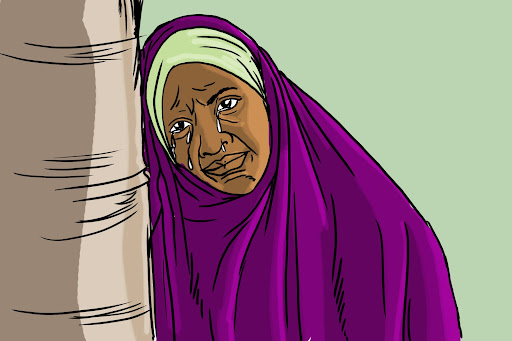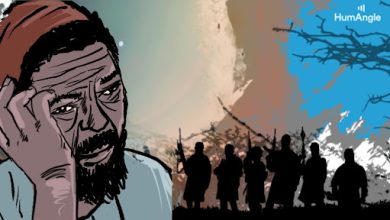Women In Abusive Marriages; ‘I Wished I Had Never Married…’
Women fleeing the Boko Haram insurgency in Maiduguri, Northeast Nigeria, are exposed to increased domestic violence in their homes.

“It started when we moved to Maiduguri after sudden attacks by Boko Haram terrorists in Bama LGA,” Fatima said.
Fatima, a mother of five children, married seven years ago in Borno state, Northeast Nigeria. In her first year, when she and her husband lived in their hometown, marriage was happy enough.
But, she said, unknowingly, she had married a monster.
After Fatima and her husband fled from Bama to Maiduguri, the state capital, the next six years were miserable.
Attacks by terrorists forced many people to flee across the state to find a home. They lost their income and property to the crisis. Loss of income and property could result in trauma for many households. But in men who are unable to control themselves, a violent response to such setbacks is always a possibility, even if there had been no indication it was there before.
The loss of status caused by being forced from his previous life was a trigger for the male aggression that lay dormant.
Life for Fatima became unbearable. She wished she had never married.
These days, her husband abuses, maltreats, and dislikes her for no reason, she said. On the other hand, he shows love to her co-wife unconditionally.
Fatima lived in the same two-bedroom apartment with her co-wife. But her husband only provides food for the co-wife, and not for Fatima and her children.
She and her children endured days and nights of hunger.
“I suffered… I don’t know anyone here, I don’t have any relatives here,” Fatima said, “I only get assistance from residents of the community or my neighbours; they sometimes give me a token, a dress or hijab, or soap which I use for myself and my children.”
The crisis forced her to flee from her home, and having been flung away from everyone she knew, it has been difficult for Fatima to seek support or help from any familiar people or family members. This has made her reliant on only the goodwill of neighbours and strangers.
“If not because of these generous residents, we cannot wear our clothes because of how dirty it is. I don’t have money to buy food, where will I even get money to buy soap?… If I ask him for money, he says he doesn’t have it, even N5 he says he doesn’t have it,’’ she said.
One morning when Fatima and her children couldn’t get a meal to eat, she had to go out and roam around her neighbourhood. She was given N100 by a concerned neighbour. She bought sweet potatoes to cook for her children. They had to make them last for two days.
Another reason, besides her being away from her family, that made her remain in the marriage was her children and the fear of being stigmatised as a divorcee, she said. If they are divorced, the children will likely stay with their father. She dreads to think of how her life and that of her children will end up if she is not there for them.
Many women suffer from violence from their intimate partners in their own homes but are compelled to endure such inhuman acts because of religious beliefs, culture, and what society will say if the woman seeks divorce or speaks out.
When such women complain to their parents or guardians, many are asked to endure and never come back home. This has given men the impetus to continue with the impunity of domestic and gender-based violence against women, women’s rights activists say.
Violence
The problems of violence against women were widespread in northern Nigeria, before the Boko Haram crisis began.
According to Zara Kareto, an advocate and activist against SGBV and a promoter of gender equality, you are seen as someone who is against cultural and religious belief when you speak against violence meted on women and girls.
“When you advocate for gender equality and women emancipation in society, you are labelled a western world agent who wants to adulterate their culture with Western world’s way of life,” said Kareto.
This has become even more charged since questions about what is “western” behaviour and if it is acceptable have also become more violent with the emergence of the Boko Haram terrorists.
The fear of being called derogatory names or labelled as rebellious has made women remain silent in the face of oppression and subjugation, which has contributed to the increase in SGBV, according to Zara and other advocates.
The effect can be seen in areas outside the home, in society at large, says Kareto.
“A male coursemate was angry when a woman was made to lead an assignment group presentation. He vehemently opposed her leadership of the group and was vowing that a woman cannot and does not lead him. His behavioural act and outburst showed how women are oppressed, discriminated and subjugated in Maiduguri.”
Globally, nearly one-third of all women who have been in a relationship have experienced violence by their intimate partner, and as many as 38 per cent of all murders of women are committed by intimate partners, according to the World Health Organisation report on intimate partner violence and non-partner violence against women.
As many as 603 million women live in countries where domestic violence is not yet considered a crime, according to a campaign to end violence against women from the office of the United Nations Secretary-General.
Most women who experience violence never seek help or report it. Data from 30 countries shows that only four in every 10 seek help at all, and only six per cent go to the authorities.
In a typical setting of Maiduguri, the Borno State capital, traditional norms and religious beliefs system have dominated family relationships and prevented societal recognition of domestic violence, and hampered all interventions in matters of violence against women.
Women are vulnerable to violence and are kept economically dependent on men.
Domestic violence, like rape by men, is said to be the cause of numerous sexual and reproductive health issues, including sexually transmitted diseases and infections and unwanted pregnancy by women and young girls in Borno State.
Domestic violence and violence against women is not just a local issue but a global problem which has continued to affect the fundamental human rights of women and their social, political, and economic development, say the International Institute of Academic Research and Development.
Intimate Partner Violence (IPV) is one of the commonest forms of violence against women, which takes place both online and offline, says Queeneth Andrew of Initiative For Community Health and Crisis Response (ICHCR).
“Due to the conservative nature of most societies on this isssue, riding on deep-rooted societal norms generated from culture, beliefs and the backlash faced for being vocal, people are most likely to adopt the culture of silence. This ingrained negative normalcy has led girls and women to face physical, sexual, and psychological harm rendering them unable to thrive effectively and lack the ability to contribute their quota to society and sustainable development at large.”
Fatima Umar, an activist and counsellor who has worked with IRC International Rescue Committee, told HumAngle that women should be celebrated because it takes a lot of courage and hard work for every woman to attain a certain position at the top. Globally, women are doing a lot for society, but the culture, religion and ego of men becomes a challenge in some localities, she said.
Way forward
Activists have called on actors to take practical steps towards ensuring that intimate partner violence comes to an end, perpetrators are brought to justice, and the survivors get the help they deserve. Women also need to be made aware of reporting channels for IPV, which encompasses access to the internet and capacity-building sessions, especially online safety. This would bring women closer to creative solutions that meet their needs and promote gender equality, Queeneth added.
Aisha Tijjani Jidda is a 2023 HumAngle Accountability Fellow from Borno, Nigeria.
Support Our Journalism
There are millions of ordinary people affected by conflict in Africa whose stories are missing in the mainstream media. HumAngle is determined to tell those challenging and under-reported stories, hoping that the people impacted by these conflicts will find the safety and security they deserve.
To ensure that we continue to provide public service coverage, we have a small favour to ask you. We want you to be part of our journalistic endeavour by contributing a token to us.
Your donation will further promote a robust, free, and independent media.
Donate HereStay Closer To The Stories That Matter




